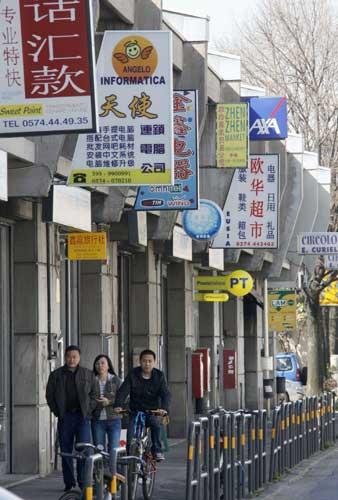
Chinese youth walk along Pistoiese street, in Prato, nicknamed "little China." Photo: AFP
Working 'til they drop
According to Silvia Pieraccini, journalist and author of a book on the Chinese textile industry in Prato, the workers live in the warehouses because they labor 18 hours a day and sleep where they drop.
"The Chinese work a great deal, they are very quick to understand where the market is going, but they work in deplorable conditions, without contracts and in buildings that are unsafe and often unhygienic," she said.
"The Chinese textile sector makes a huge profit and it's obvious that the possibility to make large amounts of money is bound to attract criminals."
Forty-seven-year-old Surong Badeng from Xinjiang Uyghur Autonomous Region, a police interpreter, said the Chinese community worked hard through choice, not exploitation.
"They come to Italy to make money and have no time to integrate. They are ready to make huge sacrifices to get rich," he said.
Conflicting official views
Prato's mayor insists that the police crackdown to clean up the textile industry is about protecting exploited Chinese.
"We want to get closer to those who are being exploited in the hope that we can persuade them to rebel," Cenni said.
That is not the way the Chinese embassy sees it.
"It's wrong of Italy to carry out raids with helicopters and dogs, it's completely over the top. We're not at war, this is a civil country," Tang Youjing, a counsellor at the Chinese embassy, told AFP.
Referring to the city's struggle to regain its status as the main center for the Italian textile industry in the wake of the financial crisis, Tang said, "The Chinese are helping Prato to resolve its economic problems."
